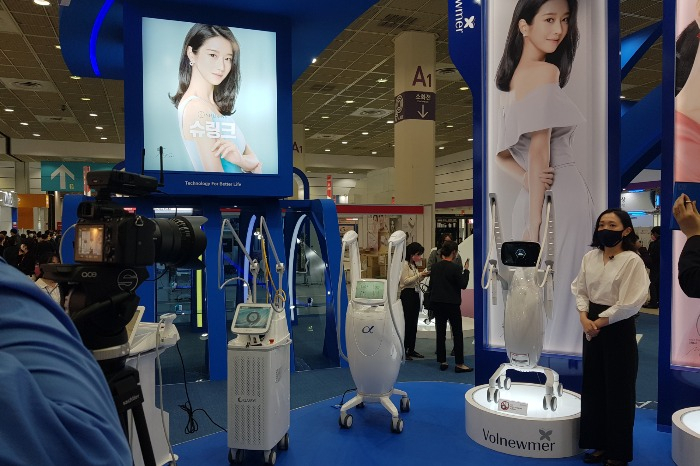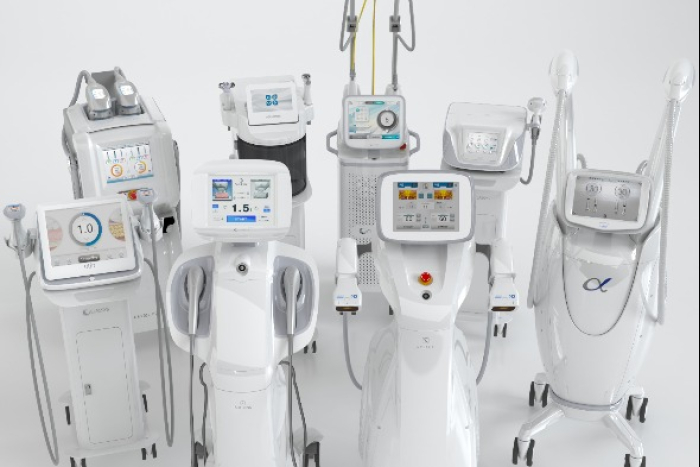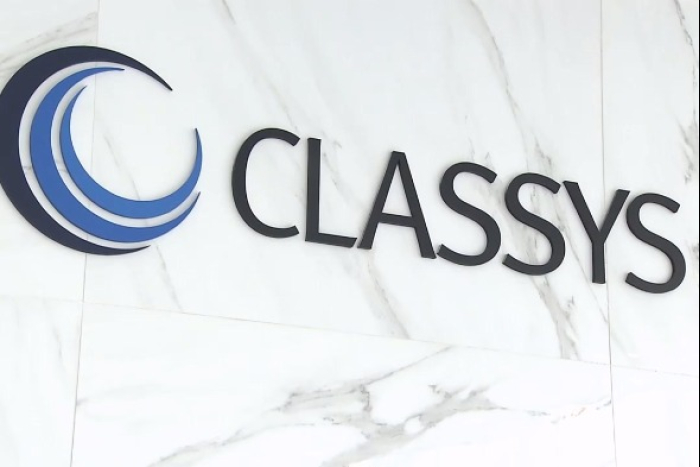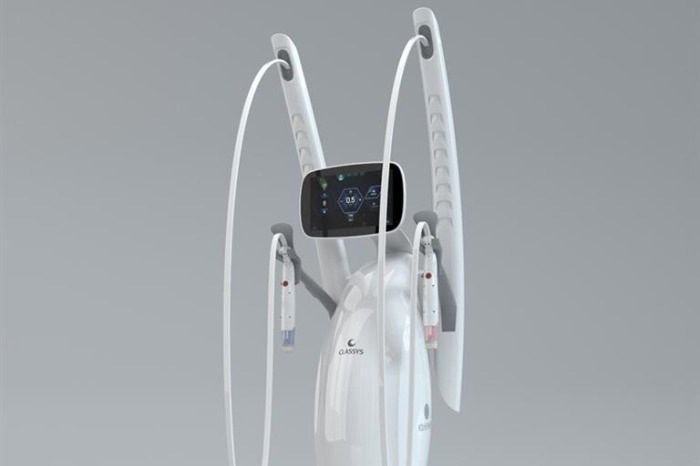Bain Capital puts beauty device maker Classys on market
The private equity firm pocketed handsome returns from two South Korean beauty companies
By Oct 21, 2024 (Gmt+09:00)
Samsung steps up AR race with advanced microdisplay for smart glasses


When in S. Korea, it’s a ritual: Foreigners make stops at CU, GS25, 7-Eleven


Maybe Happy Ending: A robot love story that rewrote Broadway playbook


NPS yet to schedule external manager selection; PE firms’ fundraising woes deepen


US auto parts tariffs take effect; Korea avoids heavy hit



Bain Capital has embarked on the process to sell a majority stake in Classys Inc., a South Korean medical aesthetic device maker. The deal is estimated at 3 trillion won ($2.2 billion), or about four times its purchase price, according to people with knowledge of the matter on Monday.
The US private equity firm is contacting investment banks to discuss the deal structure and conditions for what would be its third exit from a Korean beauty company and the sector’s largest-ever M&A deal. It plans to select an underwriter as early as the end of this year.
Bain is putting about a 60% stake in Kosdaq-listed Classys on the market at a premium of about 25% to its market price as of Monday's close, two and a half years after buying it for 670 billion won.

Classys is best known for the beauty device Shurink Universe, which uses high-intensity focused ultrasound (HIFU) for skin tightening. It is the country’s unrivaled leader in the HIFU treatment device market with a 55% share.
Its rapid growth — at a faster pace than Bain Capital’s forecast — has encouraged the private equity giant to advance its exit timing, the sources told Market Insight, The Korea Economic Daily’s financial market news outlet.
DOUBLE-DIGIT GROWTH
Its operating profit leaped 34% on-year to 57.7 billion won in the first half of this year, with sales up 28.5% to 109.1 billion won. It posed a whopping 52.9% operating profit margin in the first half of this year.
Bain Capital has focused on expanding Classys’ global operations, which made up 68.7% of its revenue as of the end of August, versus 42.4% when it was in the hands of its founder and former CEO Jung Sung-jae.
It is rapidly building its presence in Brazil, Australia, Thailand and Taiwan, while preparing to foray into the US and China, the world’s two biggest beauty markets.
In 2023, Bain Capital acquired another domestic aesthetic device manufacturer Ilooda Co, for an undisclosed sum, which Classys absorbed this year.

Industry observers said Classys has more room to grow as the anti-aging device market enters the popularization stage.
The global beauty device market is forecast to double to $11.2 billion by 2028 from $5.6 billion in 2022.
The steady demand for device expendables is expected to prop up Classys’ bottom line. Expendable supplies accounted for 87% of its device sales in the second quarter of this year.
Seoul-based private equity firm Hahn & Co., LG Group and Samsung Group are touted as potential buyers of Classys.
In February, Hahn & Co. acquired Lutronic Co., a domestic skin care device manufacturer.

By acquiring Classys, LG H&H Co., a daily beauty products maker, could diversify its beauty portfolio that is heavily dependent on China. Samsung has Samsung Medison Co., a medical device manufacturer, under its wing.
Classys's high valuation might put off potential bidders, however.
Its market capitalization of nearly 4 trillion won is more than 40 times its earnings before interest, tax, depreciation and amortization (EBITDA) of 93.6 billion won in 2023.
“Classys has high profitability and growth potential. But its estimated price, a multiple of 40 to 50 times EBITDA, is too high to draw bidders,” said an industry observers.

Since 2017, Bain Capital has made lucrative divestments in Korea from skincare brand Carver Korea and Hugel Inc., the country's largest botox producer.
It reaped a sevenfold return from its 430-billion-won purchase of Carver Korea in 2017, just one year after its investment. Its exit from Hugel generated a more than 20% internal rate of return, or nearly 1 trillion won in proceeds.
Write to Jong-Kwan Park and Jun-Ho Cha at pjk@hankyung.com
Yeonhee Kim edited this article.
-
 Mergers & AcquisitionsKorea Zinc, Bain Capital offer $2.4 bn share buyback vs MBK
Mergers & AcquisitionsKorea Zinc, Bain Capital offer $2.4 bn share buyback vs MBKOct 02, 2024 (Gmt+09:00)
3 Min read -
 Korean stock marketMobility firms, banks replace battery, K-culture stocks in KEDI 30 Index
Korean stock marketMobility firms, banks replace battery, K-culture stocks in KEDI 30 IndexSep 12, 2024 (Gmt+09:00)
3 Min read -
 Beauty & CosmeticsSouth Korean beauty device makers bulk up through M&As
Beauty & CosmeticsSouth Korean beauty device makers bulk up through M&AsAug 06, 2024 (Gmt+09:00)
1 Min read -
 Beauty & CosmeticsBain Capital in talks to buy Korean aesthetic device maker Ilooda
Beauty & CosmeticsBain Capital in talks to buy Korean aesthetic device maker IloodaJul 19, 2023 (Gmt+09:00)
2 Min read -
 Mergers & AcquisitionsBain Capital, Lotte Chem. among shortlisted bidders for Iljin
Mergers & AcquisitionsBain Capital, Lotte Chem. among shortlisted bidders for IljinJul 13, 2022 (Gmt+09:00)
1 Min read -
 Mergers & AcquisitionsBain Capital seals 3rd beauty M&A deal in S.Korea
Mergers & AcquisitionsBain Capital seals 3rd beauty M&A deal in S.KoreaJan 26, 2022 (Gmt+09:00)
3 Min read -
 Mergers & AcquisitionsBain Capital sells management rights of Hugel to GS-led group for $1.5 bn
Mergers & AcquisitionsBain Capital sells management rights of Hugel to GS-led group for $1.5 bnAug 25, 2021 (Gmt+09:00)
3 Min read -
 Private equityBain Capital to gain $90 mn from exit of Schwan's deal
Private equityBain Capital to gain $90 mn from exit of Schwan's dealJun 17, 2021 (Gmt+09:00)
1 Min read -
 Private equityBain Capital to invest $360 mn in Korea’s top ERP developer
Private equityBain Capital to invest $360 mn in Korea’s top ERP developerMar 02, 2021 (Gmt+09:00)
3 Min read -
 Bain Capital to invest $123 mn in South Korean online education startup
Bain Capital to invest $123 mn in South Korean online education startupMay 09, 2020 (Gmt+09:00)
2 Min read


